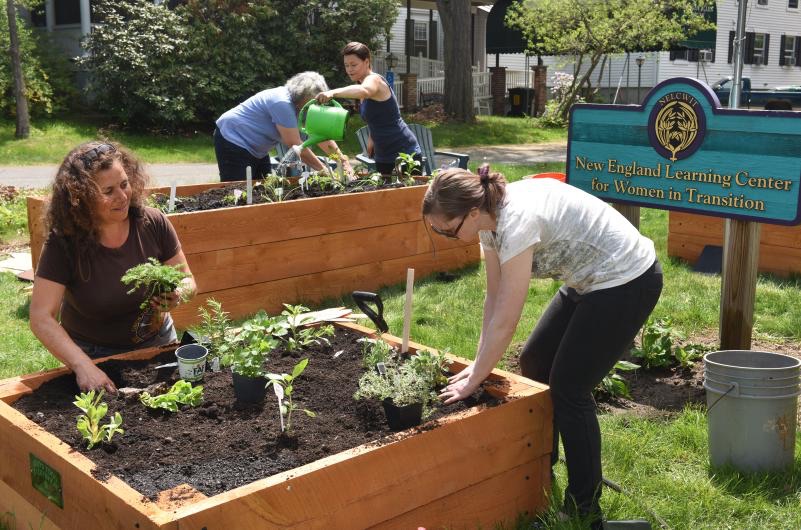RICHIE DAVIS, The Recorder
GREENFIELD (AP) — The vegetable plants now growing around the New England Learning Center for Women offices are more than just vegetables.
This week’s raised-bed plantings in front of New England Learning Center for Women in Transition’s headquarters is the culmination of a set of courses that women from NELCWIT and the Turners Falls Women’s Center have been taking as part of a grant program with Greenfield Community College’s Sustainable Agriculture and Green Energy Education (SAGE) Center.
The planting goes deeper, say organizers of the three-year project, intended to empower women from abusive relationships and challenging economic situations.
The Franklin County Women’s GARDEN Project— an acronym for Growing Agricultural Resilience and Developing Economic Networks —is funded with a three-year, $60,000 grant from the Women’s Fund of Western Massachusetts.
It’s meant to address needs faced by women trying to transition out of abusive, sometimes violent, relationships and difficult economic situations, said Abrah Dresdale, who coordinates GCC’s Food and Farm Systems program. In addition to providing good nutrition for themselves and their children, the program— which will move its focus next year to Turners Falls and then to Orange —also aims to help women learn independence through cooperative activity.
“There’s a healing aspect to working with the soil and of being self-reliant,” said Dresdale.
Working with Montague Catholic Social Ministries, NELCWIT, Seeds of Solidary Education Center in Orange, GCC is teaching three groups of about a dozen women four courses from its Food and Farm Systems program: organic gardening, food preservation and storage, permaculture and creating farm and food cooperatives.
“In the food and preservation course, the women got to try different recipes and adapt them at home, with taste testing,” Dresdale said. “Everyone’s very invested and excited about their personal adaptation. It’s something that brings the community together. They’re working in teams and knowing they’re going to be growing these strawberries and can or freeze or dehydrate them to have nutritional food around the year. That’s very empowering.”
The first group of women, who finished planning, building and planting four raised-bed gardens in Greenfield this week before moving on to their third and final course, are learning skills and building camaraderie as they work together on building their boxed gardens.
“We learned how to build the raised beds, and then we filled them and did the planting,” said Janet Diani, one of the participants from the Turners Falls Women’s Center.”
“Working together, we were learning how to do it; people were helping other people figure stuff out, and there was a lot of laughter, a lot of feeling like, ‘We could do this ourselves at home, and do this for other people,'” Diani said. “That was really important for all of us, building a community. Especially doing all four classes together, we’re experiencing all of it together, knowing each other and feeling safe and growing and asking questions. That really gave us a sense of independence.”
The women, taught by Deb Habib of Seeds of Solidarity and aided by GCC food and farm system students serving as interns, planted an herb garden as well as vegetables, plus blueberries, strawberries and Juneberries to share with other women who come to NELCWIT in the future, said Dresdale. Some may also be offered to the public as well.
Plans for next year also call for planting some fruit trees as well in Unity Park as “public produce” for Turners Falls, she said. A similar set of courses is planned for Orange, where NELCWIT has a satellite office.
In NELCWIT’s front yard, where one of the three boxes was purposely planted 2 feet high so it can also be used by women with physical limitations, “we decided who would come, in rotation, to water it, and then talked about how to teach some of the women who come into NELCWIT to be able to use it,” said Diani, labeling each of the plants in English and Spanish explaining what each plant is, how to care for it and harvest it. “Those of us took this course this year will continue to help mentor other women.”
Ilana Gerjvoy, NELCWIT’s director of advocacy and crisis services, said, “All of the women here at NELCWIT have gone through lot in their lives or are still going through a lot … They really love the chance to offer something to the community, and they’re creating something that will be available to the whole community. Doing something in cooperation as a team feels really good. They’re taking a leadership role, asking me what would be most useful for the community, and as people who are receiving services, it’s really meaningful to be able to provide something, to be able to set up something the whole community can benefit from. It feels very gratifying.”
Working together on projects not related to their trauma, Gerjvoy said, “is so important for people who have gone through difficult things, to see they’re not alone. That’s my sense. I really loved watching the women communicating with each other. They clearly felt safe sharing ideas: some thought the best way of doing things was this, or that … and they were hearing each other out, coming up with consensus. Especially coming from a situation with very abusive dynamics, it’s powerful to feel what it means when everyone has a voice. They have a shared experience that can be done in a cooperative way— instead of ‘Do it my way, because I said so.'”


